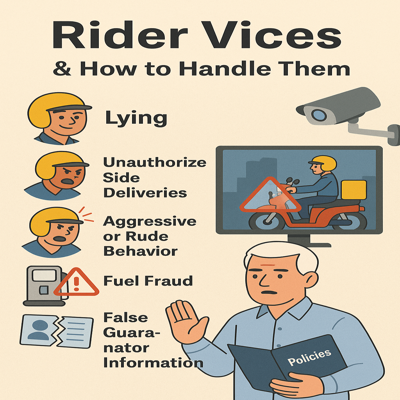This course is designed to help logistics managers, business owners, and supervisors identify and effectively manage common behavioral and operational challenges (vices) exhibited by dispatch riders. From lateness and poor communication to careless driving and mishandling of packages, participants will explore the root causes of these issues and learn proactive strategies to address them.
Dispatch Rider Misconducts & How To Handle Them

Scenario: The Late Rider & Lost Package
Background:
Mr Tunde is the operations supervisor for a fast-growing e-commerce business in Lagos. He manages a team of 7 dispatch riders responsible for delivering orders across the city. One of the riders, Chuka, has been consistently showing up late, missing delivery time slots, and giving vague excuses about traffic or mechanical issues. Last week, he also "lost" a customer's package and couldn't give a clear account of what happened.
The customer was furious, left a negative review, and demanded a refund. Management threatened to deduct the cost from Mr Tunde’s departmental budget. Mr Tunde confronted Chuka, but the conversation turned defensive and unproductive. Mr Tunde is now stressed, unsure of how to discipline Chuka without causing more friction—or losing a rider when hiring is already tough.
How the Course Would Have Helped
Before the Course:
Mr Tunde relied on informal conversations and assumed riders would act professionally. He lacked a structured system for managing rider performance, didn’t document misconduct, and hadn’t received training on rider accountability systems.
After Taking the Course:
-
Early Identification of Vices:
Mr Tunde would have learned to spot early warning signs like chronic lateness, excuse patterns, or lack of documentation. He’d understand that such vices are often symptoms of deeper issues like poor motivation, unclear expectations, or lack of consequences. -
Clear Communication & Expectations:
The course would equip Mr Tunde with communication templates and a rider handbook, helping him set clear rules about punctuality, package handling, and reporting procedures. -
Structured Disciplinary Process:
Instead of ad hoc confrontations, Tunde would now use a step-by-step performance management approach: verbal warning → written notice → probation → dismissal (if necessary)—all documented professionally. -
Motivation & Engagement Tools:
The course teaches supervisors how to blend enforcement with encouragement. For instance, Mr Tunde might introduce a monthly rider performance bonus or a simple recognition system for top performers. -
Reduced Risk & Business Losses:
With systems in place, Mr Tunde reduces the risk of customer complaints, refunds, or reputational damage. He also protects himself and the company with proper records and traceable procedures.
Bottom Line:
If Mr Tunde had taken the “Common Dispatch Rider Vices & How to Handle Them” course earlier, he would have managed Chuka’s behavior more effectively, avoided customer dissatisfaction, and strengthened his dispatch team’s professionalism and reliability.
Who The Course Is For:
Operations managers, logistics coordinators, business owners, HR personnel, and anyone responsible for overseeing dispatch riders.
What You will Learn
- List of Common Rider Issues and How to Address Them
- Causes of rider misconduct and underperformance
- Communication breakdowns and how to fix them
- Setting expectations and enforcing compliance
- Motivating riders through feedback and recognition
What You Will Get:
- Practical Tests & Quizzes – To reinforce key concepts and assess understanding.
- Ready-to-Use SOPs (Standard Operating Procedures) – For handling behavioral issues, communication breakdowns, and performance monitoring.
- Customizable Templates – Including warning letters, performance review forms, rider evaluation checklists, and code of conduct.
- Certificate of Completion – Official proof of your new skills in dispatch rider management.
- Homework Assignments – Hands-on tasks and case scenarios to apply learning in real-world situations.
| Certificate | Price |
|---|
